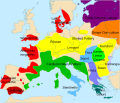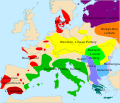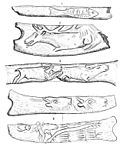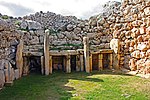Approximately 120–150 Neolithic earthworks enclosures are known in Central Europe. They are called Kreisgrabenanlagen ("circular ditched enclosures") in German, or...
13 KB (1,199 words) - 16:30, 10 September 2024
Goseck Circle (redirect from Goseck enclosure)
remained in use until about 4700 B.C. Thus, it may be the oldest and best known of the circular enclosures associated with the Central European Neolithic. Currently...
12 KB (1,270 words) - 11:07, 4 May 2024
European Neolithic is the period from the arrival of Neolithic (New Stone Age) technology and the associated population of Early European Farmers in Europe...
71 KB (6,213 words) - 06:33, 13 September 2024
insignia Roundel enclosure, a neolithic monument type: Neolithic circular enclosures in Central Europe Roundel (fortification), a type of circular artillery...
1 KB (215 words) - 22:17, 24 July 2024
enclosures Causewayed enclosures Enclosed cremation cemeteries Henges Henge enclosures Hill-slope enclosures Kraals Neolithic circular enclosures in Central...
29 KB (2,834 words) - 18:19, 13 July 2024
Astronomical complex (section Central Europe)
Goseck circle and other Neolithic circular enclosures in Central Europe In 2006, then Atlit Yam was discovered in Israel in 2009, dated with certainty...
7 KB (777 words) - 19:02, 4 May 2023
Neolithic architecture refers to structures encompassing housing and shelter from approximately 10,000 to 2,000 BC, the Neolithic period. In southwest...
10 KB (1,204 words) - 22:30, 30 June 2024
Göbekli Tepe (category Pre-Pottery Neolithic B)
9500 BCE to at least 8000 BCE, during the Pre-Pottery Neolithic. It is famous for its large circular structures that contain massive stone pillars – among...
77 KB (8,345 words) - 10:43, 11 November 2024
excavations in Central Europe have revealed that early Neolithic Linear Ceramic cultures ("Linearbandkeramik") were building large arrangements of circular ditches...
79 KB (8,075 words) - 04:40, 10 November 2024
Henge (redirect from Henge enclosure)
Hodgson, J. (2003) Neolithic Enclosures in the Isar Valley, Bavaria in Enclosures and Defences in the Neolithic of Western Europe (Part ii), Burgess,...
25 KB (2,982 words) - 04:07, 27 October 2024
Pre-Pottery Neolithic A (PPNA) denotes the first stage of the Pre-Pottery Neolithic, in early Levantine and Anatolian Neolithic culture, dating to c. 12...
18 KB (1,807 words) - 01:32, 11 November 2024
Bell Beaker culture (section Central Europe)
large circular enclosures were built at Pömmelte and nearby Schönebeck in central Germany. These were important ritual sites which remained in use until...
165 KB (19,253 words) - 19:50, 11 November 2024
The Pre-Pottery Neolithic (PPN) represents the early Neolithic in the Levantine and upper Mesopotamian region of the Fertile Crescent, dating to c. 12...
19 KB (1,968 words) - 06:00, 11 August 2024
Megalith (redirect from Megalithic Europe)
broad terraces, circular enclosures known as henges, and frequently artificial mounds such as Silbury Hill in England and Monte d'Accoddi in Sardinia (the...
73 KB (7,998 words) - 19:42, 16 October 2024
Mesolithic (redirect from Mesolithic Europe)
and the Neolithic. The term Epipaleolithic is often used synonymously, especially for outside northern Europe, and for the corresponding period in the Levant...
34 KB (3,409 words) - 03:23, 10 November 2024
Lengyel culture (category Neolithic cultures of Europe)
of the European Neolithic, centered on the Middle Danube in Central Europe. It flourished from 5000 to 4000 BC, ending with phase IV, e.g., in Bohemia...
11 KB (812 words) - 16:14, 3 August 2024
Linear Pottery culture (redirect from Danubian Neolithic)
Linear Pottery culture (LBK) is a major archaeological horizon of the European Neolithic period, flourishing c. 5500–4500 BC. Derived from the German Linearbandkeramik...
76 KB (8,519 words) - 12:38, 8 November 2024
Causewayed ring ditch (category European archaeology stubs)
the causewayed enclosures they resemble. In the British Isles they date to the Neolithic period. Historic England. "Causewayed enclosure and two ring ditches...
1 KB (93 words) - 19:57, 8 November 2024
Unchambered long barrow (redirect from Chamberless enclosure)
of this type lies in La Trinité-sur-Mer. Barrows with enclosures of wooden posts (without stone) are the Middle Neolithic enclosures of the Passy type...
8 KB (1,028 words) - 05:03, 21 October 2024
Stroke-ornamented ware culture (category Archaeological cultures of Europe)
archaeological horizon of the European Neolithic in Central Europe. The STK flourishes during approximately 4900-4400 BC. Centered on Silesia in Poland, eastern Germany...
5 KB (423 words) - 17:19, 25 February 2024
Stonehenge (category Archaeological sites in Wiltshire)
western and central Europe in the Middle Neolithic. At the time the megalithic Stonehenge 3 II was constructed (2600–2400 BC) by Neolithic people, the...
152 KB (16,451 words) - 19:29, 7 November 2024
Vinča culture (category Neolithic cultures of Europe)
Turdaș–Vinča culture or Vinča-Turdaș culture, is a Neolithic archaeological culture of Southeast Europe, dated to the period 5400–4500 BC. It is named for...
36 KB (3,554 words) - 11:17, 29 September 2024
Stone circle (category Late Neolithic)
Most are found in Northwestern Europe – especially in Great Britain, Ireland, and Brittany – and typically date from the Late Neolithic and Early Bronze...
19 KB (2,047 words) - 18:26, 9 September 2024
Prehistoric religion (redirect from Neolithic religion)
widespread in the Neolithic than the Upper Paleolithic. In a wide area from the Levant through central Europe, Neolithic burials are frequently found in the...
164 KB (19,622 words) - 02:05, 15 October 2024
Long barrow (redirect from Neolithic long barrow)
of monument constructed across Western Europe in the fifth and fourth millennia BCE, during the Early Neolithic period. Typically constructed from earth...
38 KB (4,775 words) - 22:08, 1 September 2024
Prehistory (category CS1 European Spanish-language sources (es-es))
Prehistoric Europe Prehistoric Caucasus Prehistoric Georgia Prehistoric Armenia Paleolithic Europe Neolithic Europe Bronze Age Europe Iron Age Europe Atlantic...
56 KB (5,895 words) - 17:42, 3 November 2024
archaeologists include hill forts, henges, mounds, platform mounds, effigy mounds, enclosures, long barrows, tumuli, ridge and furrow, mottes, round barrows, and other...
14 KB (1,578 words) - 19:39, 20 February 2024
Megalithic Temples of Malta (category Megalithic monuments in Europe)
of World Heritage Sites in Southern Europe List of oldest known surviving buildings Megalithic architectural elements Neolithic architecture Tombs of Malta...
39 KB (4,324 words) - 23:27, 7 November 2024
trend of attacks on Neolithic enclosures across Southern Britain. On Scilly, terraced hillsides were built instead of the tor enclosures found on the mainland...
133 KB (16,087 words) - 21:37, 9 November 2024
Prehistoric Britain (category Prehistoric Europe)
such as grooved ware, appear during the later Neolithic (c. 2900 BC – c. 2200 BC). In addition, new enclosures called henges were built, along with stone...
60 KB (7,636 words) - 21:20, 26 August 2024

























